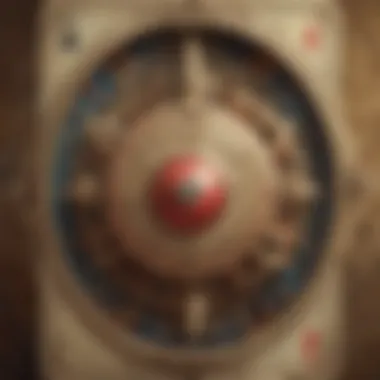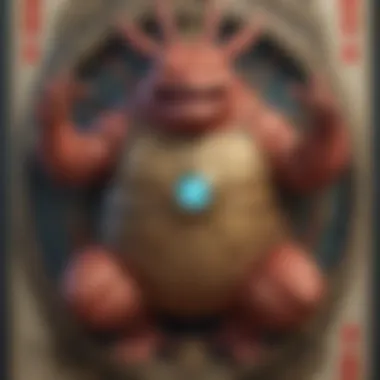Unraveling the Enigmatic Nature of a Deck of Cards


Walking Through a Deck of Playing Cards
Diving into the intricate world of a standard deck of 52 playing cards brings to light a tapestry of hidden complexities and elegant simplicity. Unveiling the enigmatic secrets locked within each of the four suits - hearts, diamonds, spades, and clubs - we journey through a realm where history and mathematical probabilities intertwine, shaping the essence of card games and extending far beyond mere entertainment.
Unraveling the Origins
The history of playing cards dates back centuries, with roots embedded in ancient Chinese, Egyptian, and Indian cultures. Tracing the evolution of these humble rectangles, from extravagant royal courts to common tavern tables, illuminates the path to their modern-day ubiquity. Each card not only symbolizes a piece of tradition but also mirrors a profound legacy that continues to captivate minds and fuel countless games of strategy and chance.
Delving Into the Composition
A standard deck comprises 52 cards meticulously divided into suits and ranks, fostering a delicate balance of order and chaos. The suits exhibit a symphony of colors - reds and blacks harmonizing across the deck, while the ranks assign unique values to every card, from the lowly two to the regal ace. This structured arrangement forms the foundation for an array of games, with each card holding a particular significance in the grand tapestry of possibilities.
Embracing the Mathematical Intricacies
Beyond their aesthetic allure, playing cards harbor a realm of mathematical complexities that enchant enthusiasts and scholars alike. Unveiling the probabilities and permutations intricately woven into every shuffle and deal unveils a profound beauty in the seemingly random distribution of cards. From calculating odds to strategizing plays, understanding these mathematical underpinnings adds a new dimension to the art of card games, blending logic and chance in an elegant dance of intellect and luck.
Embodying Significance Through Symbolism
Every card in the deck projects its own unique symbolism, transcending its numerical or visual representation to embody deeper meanings and interpretations. Whether unraveling the mysteries of symbolism in tarot cards or deciphering the esoteric messages in a hand of bridge, each card holds a distinct aura of significance that adds layers of intrigue and depth to gameplay and fortune-telling alike.
Unveiling the Lucid yet Enigmatic Deck
In delving into the intricate nuances of a deck of playing cards, one transcends the realm of mere gamesmanship to embrace a realm where history, mathematics, symbolism, and strategy converge. Each card whispers a tale of ancient origins while paving the way for endless possibilities and unforeseen outcomes, inviting players and spectators alike to unravel the mysteries concealed within the five dozen sheets of paper that define a deck, transcending time and culture to leave an indelible mark on the ever-evolving landscape of card games and beyond.
Introduction to Cards
In this insightful section of the article, we embark on a journey to unravel the fundamental aspects of cards. Exploring the origins, structures, and significance of playing cards unveils a captivating realm of complexities that enliven card games and extend beyond mere entertainment. The Introduction to Cards sets the stage, presenting a comprehensive guide to understanding the intricate world encased in each deck.


Origins of Playing Cards
Historical Evolution of Playing Cards
Delving into the annals of history, the Historical Evolution of Playing Cards emerges as a pivotal element in tracing the lineage of these intriguing artifacts. Tracking the evolutionary path from ancient civilizations to modern-day iterations provides invaluable insights into the cultural tapestry woven by playing cards. Understanding the Historical Evolution of Playing Cards illuminates the transitions, innovations, and adaptations that have shaped these components of recreational and intellectual pursuits.
Cultural Significance
The echo of societal narratives resonates through the Cultural Significance attached to playing cards. Unveiling the ethos, beliefs, and values embedded in different cultural contexts, exploring the Cultural Significance affords a unique perspective on the multifaceted roles that cards play. From symbols of luck to instruments of strategy, these reflections on cultural contexts enrich the tapestry of card games with profound meanings and interpretations.
Basic Structure of a Deck
In uncovering the Basic Structure of a Deck, we dissect the anatomy of a standard deck, piecing together the components that form the backbone of card games. The composition of cards within a deck, their numbers, and their classifications into suits intertwine to create a symphony of possibilities in gameplay.
Number of Cards in a Standard Deck
The numerical fabric of a standard deck sets the stage for diverse gaming experiences, dictated by the unique count of cards comprising the deck. Exploring the significance of the specific number of cards sheds light on the balance, probabilities, and strategic dimensions inherent in different games. Understanding the Number of Cards in a Standard Deck unveils the mathematical underpinnings that dictate the pace and intricacies of gameplay.
Suits in a Deck
The division of cards into suits forms the cornerstone of gameplay dynamics, assigning each card a distinctive identity and function within the deck. Analyzing the significance of suits in a deck illuminates the hierarchical structures, thematic variations, and strategic nuances that govern game mechanics. Delving into the Suits in a Deck reveals a harmonious blend of symmetry and diversity, enriching the gameplay experience with layers of complexity and depth.
Mathematics Behind a Deck of Cards
In the extensive world of cards, the Mathematics Behind a Deck of Cards plays a crucial role, guiding players through the realm of probabilities and arrangements. Understanding the mathematical concepts behind a deck enhances strategic thinking and decision-making in card games. It provides insight into the likelihood of certain card combinations appearing and helps players develop winning strategies. Delving into the Mathematics Behind a Deck of Cards unlocks the door to a deeper appreciation of the game's intricacies and the varied possibilities within each shuffle and deal.
Probability and Cards
Calculating Probabilities in Card Games


Calculating Probabilities in Card Games is a fundamental aspect of strategic gameplay, allowing players to assess the likelihood of specific outcomes based on the cards dealt. By calculating probabilities, players can make informed decisions, adjusting their strategies accordingly to maximize their chances of winning. Understanding the probabilities enhances risk assessment and strategic planning, transforming random chance into calculated moves that increase the likelihood of success.
Concept of Randomness
The Concept of Randomness introduces an element of unpredictability into card games, keeping each hand unique and exciting. Embracing randomness adds an element of surprise and challenge to gameplay, requiring players to adapt to ever-changing situations. While randomness can lead to unexpected outcomes, it also infuses games with a sense of spontaneity and exhilaration, making each round a thrilling and unpredictable experience.
Combinatorics in Card Arrangements
Permutations vs. Combinations
Permutations vs. Combinations play a significant role in determining the different ways cards can be arranged within a deck. Understanding the distinction between permutations and combinations is essential for exploring the various possibilities of card sequences and arrangements. While permutations focus on the order of cards, combinations consider the selection without regard to order, impacting the potential outcomes and strategies employed in card games.
Factorials and Card Sequences
Factorials and Card Sequences offer a mathematical foundation for understanding the number of possible arrangements within a deck. By utilizing factorials, players can calculate the total combinations of cards and anticipate the potential sequences that may occur during gameplay. The concept of factorials enriches the strategic aspects of card games, providing insights into the complexities of card arrangements and the diverse patterns that can shape the outcome of each game.
Types of Card Decks
Variations in Deck Configurations
Tarot Decks:
When delving into the specifics of Tarot Decks, their contribution to the comprehensive understanding of cards becomes evident. The key characteristic of Tarot Decks lies in their interpretive nature, often used for divination and introspection purposes. The unique feature of Tarot Decks is the rich symbolism embedded in each card, offering layers of meanings and insights. While Tarot Decks enhance the mystical essence of this article, their disadvantage may lie in being less conventional for traditional card games.
Poker Decks:
Turning the focus towards Poker Decks sheds light on their significant role in the realm of card games. The key characteristic of Poker Decks is their standardized fifty-two card structure, optimized for various poker variations like Texas Hold'em and Omaha. The unique feature of Poker Decks is their high durability and versatile usage across different gaming environments. Poker Decks emerge as a popular choice due to their widespread recognition and adaptability, making them a valuable asset in this exploration.
Bridge Decks:


Exploring Bridge Decks offers insights into their distinctive attributes and relevance to this study. The key characteristic of Bridge Decks is their specific composition of fifty-two cards, designed for the game of bridge with its bidding and trick-taking elements. The unique feature of Bridge Decks is their tactile quality and easy shuffleability, essential for efficient gameplay. Bridge Decks stand out as a beneficial choice for this article due to their significant role in social card gaming circles, although their disadvantage may be their limited utility outside bridge-specific contexts.
Specialized Decks
Oracle Decks:
Within the domain of Specialized Decks, Oracle Decks carve a niche for themselves in enriching the discussion on card decks. The key characteristic of Oracle Decks is their intuitive design focused on providing guidance and spiritual insights. The unique feature of Oracle Decks is their capacity for personal reflection and introspection, making them a popular choice for holistic card readings. While Oracle Decks offer depth and nuanced interpretations, their disadvantage may stem from being less suitable for conventional card games.
Collector's Edition Decks:
Lastly, Collector's Edition Decks occupy a unique space in the world of card collecting, adding a layer of exclusivity and artistry to this narrative. The key characteristic of Collector's Edition Decks is their limited availability and premium craftsmanship, appealing to enthusiasts seeking rare and aesthetically pleasing card sets. The unique feature of Collector's Edition Decks is their investment value and potential for appreciation over time, attracting collectors passionate about unique pieces. Collector's Edition Decks bring a sense of sophistication and prestige to this article, although their disadvantage may lie in their higher price point and collectible-focused nature.
Significance in Games and Beyond
When considering the intricate world of a deck of cards, it is crucial to understand the profound significance it holds in games and beyond. Each card in a deck plays a unique role that transcends mere gameplay, delving into psychological, cognitive, and even educational realms. Beyond the realms of chance and strategy lie the deeper layers of human nature that are reflected and engaged through card play. This section will dissect the multifaceted importance of cards in various aspects of life, offering a profound exploration of their impact.
Psychological Aspects of Card Play
Luck vs. Skill
Luck and skill are pivotal elements that shape the dynamics of card play. Luck introduces an element of unpredictability, adding excitement and tension to each game. On the other hand, skill enables players to strategize, analyze, and make calculated moves based on probabilities and opponents' behaviors. The balance between luck and skill is a constant theme in card games, where mastering this interplay is often key to success. This section will elucidate the role of luck and skill, their influences on gameplay, and how players navigate these varying forces.
Decision-Making Dynamics
The decision-making process in card games is a complex and fascinating aspect that influences the outcome of each play. Players must weigh various factors such as probabilities, opponent behavior, and future consequences when making decisions. This intricate dance of analyzing, predicting, and choosing adds a layer of strategic depth to card games, challenging players to think critically and adapt to ever-changing game situations. Understanding decision-making dynamics is essential for players seeking to enhance their gameplay skills and overall gaming experience.
Educational and Recreational Value
Memory Training
Memory training is an invaluable aspect of card play that stimulates cognitive abilities and enhances mental acuity. Players must remember cards that have been played, track opponents' moves, and recall key information to make informed decisions. Regular engagement in card games can significantly improve memory retention and cognitive agility, making it a beneficial activity for individuals of all ages. This section will delve into the importance of memory training in card games, its impact on cognitive function, and how it contributes to overall gameplay experience.
Cognitive Development
Card games also offer a platform for cognitive development, fostering skills such as problem-solving, critical thinking, and strategic planning. Engaging in card play requires individuals to analyze situations, anticipate outcomes, and adjust strategies accordingly – all of which are fundamental aspects of cognitive development. By challenging the mind and promoting mental agility, card games serve as effective tools for honing cognitive skills and fostering intellectual growth. This section will explore the role of card games in cognitive development, highlighting their educational value and long-term benefits.





